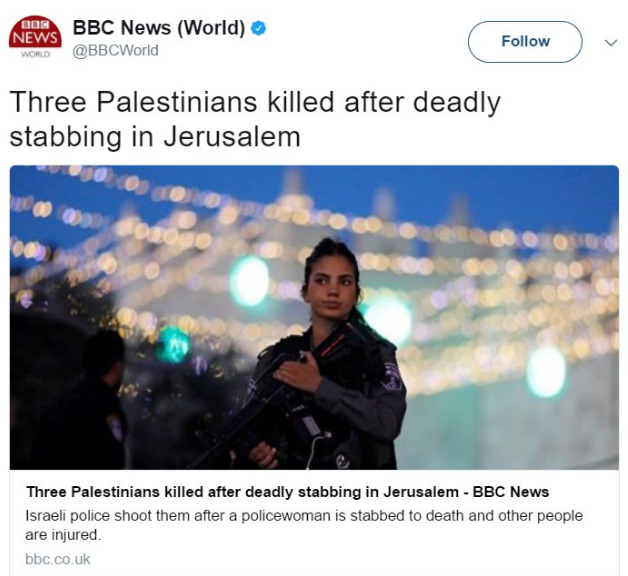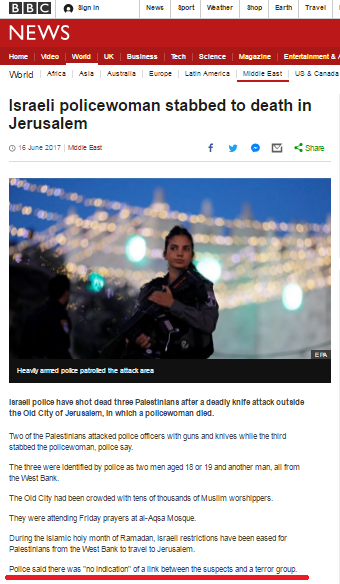On the evening of June 16th three Palestinian terrorists from a village near Ramallah carried out a combined attack in Jerusalem. Border Police officer Hadas Malka was critically wounded while responding to the incident and doctors were unable to save her life. In addition, four more people were wounded. While ISIS claimed responsibility for the attack, Hamas rejected that claim:
“Early on Saturday morning, Hamas rejected IS’s claim of responsibility, saying the three belonged to Palestinian terrorist organizations.
“The claim by the Islamic State group is an attempt to muddy the waters,” said Sami Abou Zouhri, spokesman for the terrorist group which runs the Gaza strip.
The attack was carried out by “two Palestinians from the Popular Front for the Liberation of Palestine and a third from Hamas,” he said.”
The BBC’s report on the attack currently appears on the BBC News website under the headline “Israeli policewoman stabbed to death in Jerusalem“. However, the article was originally titled “Three Palestinians killed after deadly stabbing in Jerusalem” and that was also how the BBC portrayed the incident on social media – much to the ire of many Twitter users.

As we see, that headline and sub-heading both fail to inform BBC audiences that the “Palestinians killed” were the terrorists who carried out the “deadly stabbing”.
As a result of public pressure, the BBC deleted that Tweet and posted a replacement some 24 hours after the attack took place. Readers may recall that this is by no means the first time that a BBC headline concerning a terror attack in Israel has prompted public outrage.
As is inevitably the case in BBC coverage of Palestinian terror attacks in Israel – and in stark contrast to BBC portrayal of similar attacks in Europe – the article does not describe the incident as a terror attack.
Moreover, in the later version of the report readers found the following representation of a statement from Israeli officials saying that there was no indication that the terrorists were connected to ISIS:
“Police said there was “no indication” of a link between the suspects and a terror group.”
In fact – as the Times of Israel reported:
“All three of the assailants were members of Palestinian terrorist organizations, according to… Israel’s Shin Bet…
The attackers were identified by the Shin Bet internal security agency as Bra’a Salah and Asama Atta, both born in 1998, and Adel Ankush, born the following year. They were shot dead by security forces as they carried out their attacks.
The three were from Deir Abu-Mashal, a village near Ramallah. All had previously been arrested for or involved in terrorist activity, a Shin Bet statement said.”
Erasing the foreign nationals (including one Palestinian) murdered by Palestinian terrorists over the last 21 months, the report tells readers that:
“Forty-two Israelis have been killed in knife, gun and car-ramming attacks by Palestinians or Israeli Arabs since October 2015.
In late 2015 and 2016, such attacks happened with near-daily frequency but the rate has declined in recent months.”
That latter inaccurate claim is recycled from a previous BBC report. In fact, while in late 2015 the frequency of attacks was far beyond “near-daily”, around a hundred attacks still take place every month meaning that they remain on average a daily occurrence on average, notwithstanding the BBC’s failure to cover the vast majority of attacks.
As readers then see, the BBC continues to employ the “Israel says” formula in its portrayal of Palestinian terrorists killed while carrying out attacks.
“More than 240 Palestinians – most of them attackers, Israel says – have also been killed in that period. Others have been killed in clashes with Israeli troops.” [emphasis added]
The article closes with a mantra that the BBC has been promoting for many months:
“Israel says Palestinian incitement has fuelled the attacks. The Palestinian leadership has blamed frustration rooted in decades of Israeli occupation.”
Once again, it is worth remembering that since the surge in terror attacks began in late 2015, the BBC has consistently failed to provide its audiences with any serious reporting on the topic of incitement and glorification of terrorism by Palestinian officials. Readers are hence unable to judge for themselves whether or not what ‘Israel says’ is accurate.
Likewise, it is noteworthy that the portrayal of terrorism as being attributable to “frustration rooted in decades of occupation” conforms to a guidance document for members of the international media put out by the PLO in November 2015.
Update:
According to Ynet, the BBC has released the following statement:
“We accept that our original headline did not appropriately reflect the nature of the events and subsequently changed it. Whilst there was no intention to mislead our audiences, we regret any offence caused.”
Related Articles:
BBC Complaints: terror attacks in Jerusalem and Tunisia are “very different”
BBC Complaints clarifies discrepancies in terminology when reporting terrorism
Radio 4 gives insight into BBC avoidance of the use of the term ‘terror’ in Israel
BBC News finds terror (without quotation marks) in Europe
BBC finds a ‘working definition’ for terrorism in Europe
A new BBC ‘explanation’ for its double standards on terror
BBC’s ‘rationale’ for its double standards on terror crumbles again




